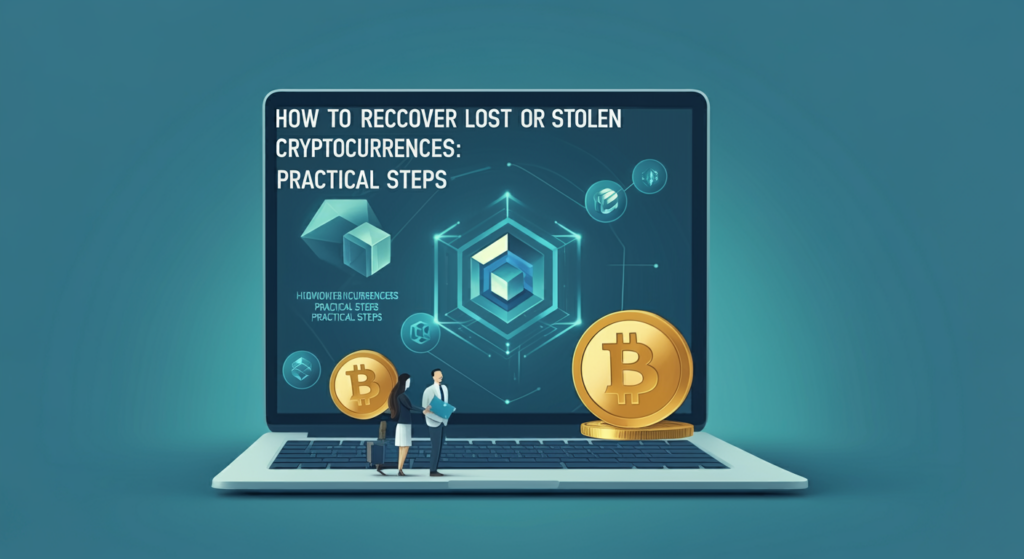
Cryptocurrencies have experienced significant growth in Nigeria and across the globe, and the accompanying risk of loss or theft has become a pressing concern for investors and users alike.
This comprehensive guide is designed to equip individuals with detailed and practical steps, along with valuable resources and targeted strategies, to effectively recover lost or stolen cryptocurrencies. By understanding the nuances of recovery, individuals can navigate the complexities of the cryptocurrency landscape with greater confidence and security. Let’s delve into these issues in more detail:
Understanding Cryptocurrency Loss: A Detailed Perspective
Navigating the complex world of cryptocurrency comes with its own set of challenges and risks. Gaining a deeper understanding of the common causes of cryptocurrency loss can empower you to safeguard your assets and enhance your recovery strategies.
- One of the most common issues encountered by cryptocurrency users is losing access to their digital wallets. This often occurs due to forgotten passwords or Personal Identification Numbers (PINs), which can lock users out indefinitely. Many wallets come with recovery options, but these hinge on having backup information.
- Private keys and seed phrases are essential for accessing and managing funds in a wallet. If these keys are misplaced, damaged, or destroyed whether through hardware failure or natural disasters, the funds may become irretrievable. For instance, losing a hardware wallet and not having a physical backup of the seed phrase can lead to a total loss of access.
- Additionally, hardware wallets can malfunction or be lost, whether due to theft or simple misplacement. Users should always ensure their hardware wallets are stored safely and securely and have backups in place for recovery.
- Sending funds to the wrong wallet address is a frequent mistake that can result in the permanent loss of cryptocurrency. Even minor errors, like a single wrong digit or letter, can lead to significant financial consequences since transactions are often irreversible.
- Using incompatible blockchain networks can complicate transactions further. For example, sending Bitcoin to an Ethereum address will result in a loss of funds because the two networks are not compatible. It’s crucial to double-check the supported networks and ensure that the receiving address matches the correct cryptocurrency.
- The cryptocurrency space is rife with threats, including sophisticated cyber-attacks such as phishing scams, hacking incidents, and malware designed to compromise personal information. Users must remain vigilant, recognizing that a seemingly innocuous link could lead to a breach of security.
- Additionally, fraudulent schemes abound, including fake investment platforms that promise high returns. Unsuspecting investors can easily fall victim to these scams, leading to severe financial losses. Thorough research and verification of investment opportunities can safeguard against these threats.
- Peer-to-peer (P2P) transactions, while offering opportunities for direct exchanges, can also be risky. Without proper precautions, users can be scammed, leading to irreversible losses. Using trusted platforms and conducting due diligence is essential when engaging in P2P transactions.
- The ever-present volatility of cryptocurrency can complicate matters when funds are held on exchanges. In extreme cases, exchanges may become insolvent or shut down suddenly due to regulatory issues or poor financial practices, leading to funds being stranded or completely lost.
- Moreover, users may experience account access issues as a result of cyberattacks on exchanges or technical difficulties. Such events can prevent timely access to funds, exacerbating the risk of missing out on critical market movements.
Practical Steps to Take After Realizing Loss

Realizing you’ve encountered a loss in the cryptocurrency space can be unsettling, but taking a methodical approach can help you navigate the situation effectively. Below are practical steps to follow:
- Stay Calm and Assess the Situation: It’s crucial to take a moment to breathe and remain calm. Panic can cloud judgment and lead to further mistakes. Carefully assess the nature of the loss. Determine whether it was due to lost access, an incorrect transaction, theft, or an issue with an exchange. Gather all relevant information that can help you in the recovery process. This includes transaction IDs, wallet addresses, timestamps, and the specific details of the exchanges and accounts involved.
- Explore Wallet Backup and Recovery Options: If your loss is linked to a digital wallet, start by locating any private keys or seed phrases that might aid in recovery. Make sure to search in secure locations where you’ve stored this information, such as encrypted notes, physical documents, or password managers. Investigate the recovery options provided by your wallet service. Many modern wallets offer built-in recovery features, and they might have step-by-step instructions to regain access to lost funds. Users may find options like password resets or multi-factor authentication to be particularly useful.
- Verify the Transaction: Utilize blockchain explorers, such as Etherscan for Ethereum-based transactions or BscScan for Binance Smart Chain, to check the status of the transaction in question. Input your transaction ID to track its progress and ensure it was processed correctly. Confirm that the funds were sent to a compatible address on the correct blockchain. Misdirected transactions can occur, and it’s vital to follow the trail to understand what happened.
- Reach Out to Your Exchange or Wallet Provider: If your loss stems from an exchange, contact their customer support team as soon as possible. Time can be of the essence in these situations. Be prepared to provide comprehensive documentation, including transaction details, screenshots, and any communication related to the transaction. Clear and concise information will assist support teams in investigating your case and facilitate a quicker resolution.
Recovering Lost Wallet Access: A Positive Approach
Losing access to your cryptocurrency wallet can be disheartening, but there are practical steps you can take to recover your funds.
- Seek Your Private Keys or Seed Phrases: Start by conducting a thorough search for any backups of your private keys or seed phrases. These might be stored in various secure locations, such as encrypted USB drives, secure cloud services, or even physical documents locked in a safe. If you’re using a software wallet, check for any recovery prompts or keys that might have been communicated to you via email or stored on the device used to set up your wallet. It’s vital to explore every reasonable avenue, as missed or overlooked backups can often lead to recovery.
- Utilize Wallet Recovery Tools: Various platforms provide wallet recovery services that can assist you in retrieving forgotten passwords or restoring access to your wallet. Make sure to research reputable services to avoid potential scams. Additionally, major hardware wallet manufacturers like Ledger and Trezor offer dedicated support teams that specialize in addressing recovery challenges. They can guide you through the recovery process step by step, offering advice tailored to your specific situation.
- Consider Professional Recovery Services: If you have substantial funds locked in a wallet and have exhausted all other recovery options, you may want to consider enlisting the help of professional recovery services. Ethical hacking firms or blockchain forensics companies specialize in assisting individuals in recovering lost wallets and funds while maintaining a strong ethical code. Before choosing a professional service, thoroughly investigate their reputation, reviews, and past successes. Look for companies with proven track records and transparent practices to ensure you are entrusting your information to a reliable source.
Recovering Stolen Cryptocurrencies: A Resourceful Strategy
Experiencing the theft of your cryptocurrencies can be a distressing situation, but implementing a strategic approach can increase your chances of recovery
- Utilize advanced blockchain analysis tools such as Chainalysis, CipherTrace, or Etherscan to trace the stolen funds. These tools empower you to visualize the movement of your assets across different wallets and exchanges, providing valuable insights into where your funds may have been transferred. By monitoring transaction histories, you may identify patterns or potential links that could lead to the recovery of your stolen funds. Keep meticulous records of relevant transaction IDs and wallet addresses, as this information will be crucial in your follow-up actions.
- It’s essential to file a report with your local authorities immediately. Provide them with comprehensive details about the theft, including all transaction information, relevant wallet addresses, and any correspondence related to the incident. Proper documentation can enhance the efficacy of their investigation and recovery efforts. Additionally, contact the exchange where your stolen cryptocurrencies were sent, if applicable. Informing them of the theft may lead to the freezing of accounts associated with the stolen assets and prevent further transactions from occurring.
- Engaging with specialists in blockchain forensics can be a critical step in effectively tracking your stolen assets. These experts use sophisticated methodologies and tools to analyze and trace cryptocurrency transactions that go beyond standard blockchain explorers. For incidents involving substantial amounts of stolen assets, consider connecting with international cybersecurity agencies or law enforcement groups skilled in handling cybercrimes. Their expertise can significantly bolster your recovery efforts and help you navigate the complexities of cross-border theft.
- Proactively sharing the wallet address associated with the theft on community platforms such as Reddit, Telegram, or dedicated forums can alert others to the situation. Engaging with online communities can increase awareness and potentially lead to tips or advice from those who have dealt with similar issues. Some cryptocurrency exchanges have protocols in place to monitor reported addresses linked to thefts. By making your concerns known, there is a possibility that these exchanges will take action to freeze the stolen funds, preventing further access by the thief.
Preventing Future Loss or Theft: Proactive Measures
Securing your cryptocurrency investments is essential for preventing future losses or theft. By taking proactive measures, you can significantly enhance your safety in the crypto space.
- Consider using hardware wallets for long-term storage of your cryptocurrencies. Hardware wallets offer a crucial layer of security by storing your private keys offline, which helps protect against hacking and malware attacks. Always enable two-factor authentication (2FA) on your software wallets and exchange accounts. This additional security layer requires not only your password but also a secondary verification method, such as a code generated by an app on your phone, making unauthorized access significantly more difficult.
- Create and maintain backups of your private keys or seed phrases. Store these backups in multiple secure, offline locations such as a safe deposit box or a fireproof safe to ensure you can access them in case of device failure or loss. Avoid keeping sensitive information on devices connected to the internet. Using paper backups or secure hardware for storage can mitigate risks associated with online threats. It’s also advisable to encrypt these backups for an extra layer of security.
- Always verify the legitimacy of investment platforms, exchanges, and wallet providers before engaging with them. Look for reviews, user feedback, and overall credibility in the crypto community to ensure that you are dealing with trustworthy entities. Exercise extreme caution with unsolicited offers or links, especially those received via email, social media, or messaging apps. Scammers often employ phishing techniques to trick users into giving away personal information, so it’s crucial to double-check the source and URL of any website before entering sensitive information.
- When selecting a cryptocurrency exchange, prioritize those with a strong reputation and robust security practices. Research their history of security incidents, user feedback and the types of security measures they implement, such as cold storage and regular security audits. Regularly withdraw funds from exchanges to your personal wallet for added safety. Keeping only a small amount of cryptocurrency on exchanges reduces your risk exposure and helps protect your overall portfolio from potential hacks.
- Stay informed about the latest security practices and emerging scams within the cryptocurrency space. The landscape evolves quickly, so ongoing education is vital for safeguarding your assets. Engage with reputable cryptocurrency communities and forums. These platforms can offer valuable insights, tips, and support from experienced users. By sharing knowledge and experiences, you can learn from both successes and mistakes, further strengthening your security approach
Legal and Regulatory Support in Nigeria
As cryptocurrency operates in a decentralized environment, it is crucial to know the legal and regulatory landscape, especially in Nigeria.
- Report Scams to the EFCC: The Economic and Financial Crimes Commission (EFCC) in Nigeria is tasked with investigating and handling cybercrime, including fraud related to cryptocurrencies. If you find yourself a victim of a scam, it is important to take action. Compile all relevant evidence before making your report. This should include comprehensive details such as wallet addresses, transaction records, dates and any correspondence with the scammers. Providing solid evidence will help the EFCC conduct a more effective investigation and possibly recover your lost assets.
- Connecting with organizations like the Blockchain Nigeria User Group can provide valuable resources and support for individuals navigating the cryptocurrency landscape. These associations often have a wealth of knowledge about legal rights, updates on regulations, and best practices in the industry. Participating in events and discussions organized by such groups can also help you network with others in the community, offering additional insights and support for your individual circumstances.
- In the face of regulatory challenges, consider utilizing trusted peer-to-peer (P2P) platforms that come equipped with escrow services. These platforms facilitate secure transactions between users without the need for a centralized intermediary, allowing you to trade cryptocurrencies with added security. Ensure any P2P platform you choose has a solid reputation and reliable user feedback. Utilizing escrow services adds a layer of protection, holding funds until both parties have fulfilled their obligations, thus reducing the risk of fraud.
Conclusion: Recovering lost or stolen cryptocurrencies can indeed be an overwhelming experience, but by equipping yourself with the right knowledge and resources, you can approach the situation practically. Acting promptly, making use of blockchain technology, and adhering to best practices significantly enhance your chances of success in recovery. Moreover, adopting robust security measures is essential for safeguarding your investments and preventing potential future challenges. Stay proactive, remain informed about the evolving regulatory landscape, and engage with the community for ongoing support. Together, these strategies can empower you to navigate the complexities of cryptocurrency confidently and securely.




